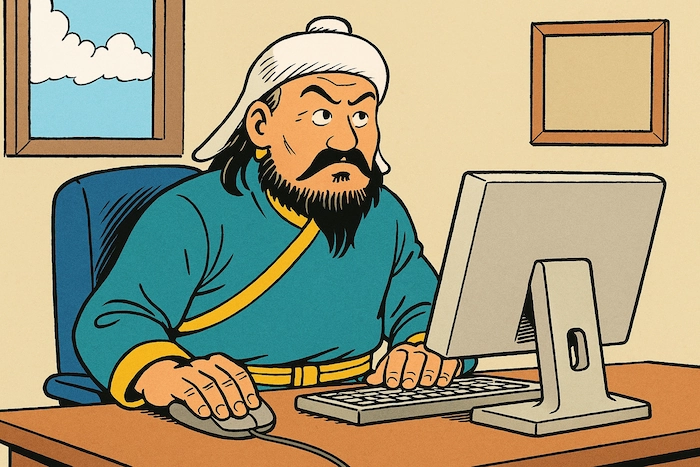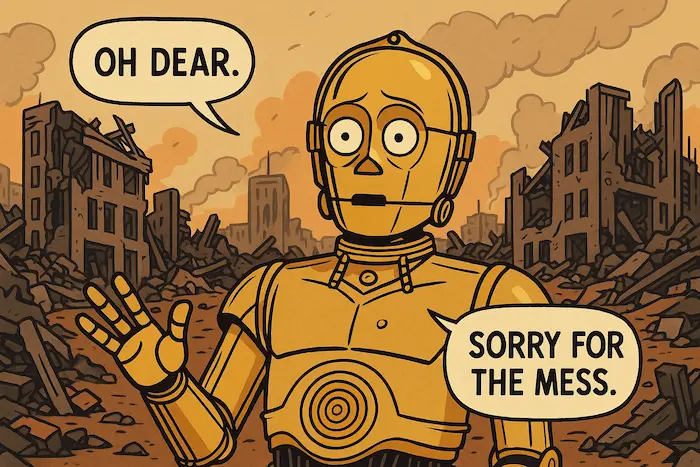Eight centuries before Silicon Valley, one man built the world's fastest-growing "startup", and his leadership playbook still makes most modern CEOs look like interns.
Freedom to believe: the original open-source policy
In an era when most leaders were busy enforcing one "correct" worldview, Chinggis Khaan rolled out an early version of open-source governance. Buddhists, Muslims, Christians, shamans, ... all were free to practice, and all were welcome to share their perspectives. He even hosted debates between religious leaders, not to crown a winner, but to absorb their best ideas.
Religious leaders were tax-exempt. Not as a PR stunt, but because Chinggis understood what some modern policymakers miss: you don't drain the people who build social and intellectual capital. You protect them, because they make the ecosystem healthier.
Startup parallel: Smart founders know innovation thrives in diverse teams. You don't get breakthroughs by cloning your own worldview, you get them by mixing the unexpected.
Women wielded real power
In the Mongol Empire, women weren't symbolic "diversity hires." They owned property, managed territories, advised on political alliances, and sometimes commanded armies.
Chinggis wife Börte and his mother Hö'elün weren't just bystanders, they shaped the empire's foundations. He even outlawed selling women, which was revolutionary in a world where most cultures treated them as assets to be traded.
Tech leadership takeaway: Stop treating women in leadership like a checkbox. If your company still needs a "women in tech" committee to be reminded they exist, you're already behind. Chinggis didn't hire for optics, he hired for survival and growth.
Personal advice: Find yourself a Mongolian wife, thank me later.
No tax on skills that compound value
Teachers, doctors, scholars, ... Chinggis didn't tax them. He saw them as infrastructure, not overhead. These people multiplied the empire's capabilities over time, and taxing them was as short-sighted as throttling your own internet speed to save electricity.
Startup parallel: R&D and L&D aren't "cost centers", they're your future revenue streams. If your first reaction to a budget crunch is cutting innovation, you're setting yourself up to be disrupted.
One world, many cultures: the first global API
The Mongols secured the Silk Road, protected merchants, and set up a network of relay stations so goods and ideas could move faster. Borders became less relevant. The empire functioned like a unified platform where different "applications", cultures, languages, technologies, ... could run and interoperate.
Tech leadership takeaway: The best companies break silos. They create internal "APIs" for departments to collaborate seamlessly, and they integrate external partnerships without fear of losing control.
Meritocracy over birthright
Temüjin (before he was Chinggis Khaan) had no family name to fall back on. He rose because of loyalty, competence, and results. Under his command, a blacksmith could end up leading a thousand soldiers if they proved themselves.
Startup parallel: Forget "founder's buddy" hires or promoting people because they've "been here the longest." In scaling teams, meritocracy is the only system that works. Otherwise you build an empire of mediocrity.
Rule of law > Rule of one
The Yassa legal code applied to everyone, from generals to goat herders. It replaced subjective decision-making with predictable systems. People didn't have to guess the mood of their leader, they could rely on a framework.
Tech leadership takeaway: In startups, this is your processes and documentation. If every decision flows through you, you're not a leader, you're a bottleneck.
Results > Ego
Chinggis Khaan didn't need a statue, a marble palace, or a PR team. He actively avoided having anything written about him in his lifetime. No memoir. No "as told to" scrolls. When he died, there was no grand mausoleum, just the continuation of an empire that worked.
He ate the same food as his soldiers. Slept in the same tents. Wore the same clothes. Not because he was pretending to be "one of the guys", but because he understood that trust isn't built from above, it's built shoulder to shoulder.
Why this still matters: Too many leaders today confuse personal branding with leadership. They want their name on the building before they've built anything worth naming. Chinggis measured his worth in results in the systems, alliances, and stability he left behind, not in how much gold he could drape over himself.
Startup parallel: Your team won't follow you because of a flashy title or LinkedIn headline. They'll follow you if you're in the trenches with them, focused on outcomes, not optics.
Trade and innovation as weapons
The Mongols spread printing technology, agricultural innovations, and even new weapon designs across continents. They weren't just moving goods, they were moving knowledge.
In today's world we don't even have full access to some technology in other countries due to several factors such as GDPR and others... But is this really moving us forward or holding us back?
Startup parallel: Companies that share and integrate knowledge across teams win faster. Hoarding information for "competitive advantage" often backfires, the real moat is execution speed, not secrecy.
Literacy by proxy
Chinggis couldn't read, but he didn't fake it or fear it. He surrounded himself with literate administrators and adopted written governance so the empire could scale beyond his own presence.
Some leaders actually got this, like good old Steve once said:
It doesn't make sense to hire smart people and then tell them what to do; we hire smart people so they can tell us what to do.
Tech leadership takeaway: You don't need to be the technical genius in the room. You need to build a team of them, give them authority, and remove obstacles so they can work.
Why this still matters for startups and tech leaders
Chinggis Khaan's empire wasn't just about conquest. It was about systems, merit, and relentless openness to talent and ideas, no matter their origin. That's the same DNA behind the best modern startups.
And yet, eight centuries later:
- Some countries still legislate against religious freedom.
- Some companies still treat gender equality as a marketing campaign.
- Some CEOs still think their gut beats a process.
Chinggis would call that bad business. And believe me, you don't want to mess with this guy.
You scale faster and survive longer when you make room for everyone who can help you win.




